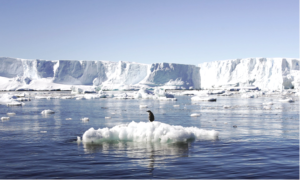
Scientists from Te Herenga Waka—Victoria University of Wellington’s Te Puna Pātiotio—Antarctic Research Centre (ARC) have contributed to a major international
study that has found sea level rise from melting glaciers and ice sheets could be halved this century if the Paris Agreement target of limiting warming to 15°C is met.
But meeting this target, the authors warn, will require deep and immediate emissions cuts. The study, led by Dr Tamsin Edwards of King’s College London
, was published in the science journal Nature. It involved 80 scientists from around the world, including Professor Nicholas Golledge and
Associate Professor Brian Anderson, both from the ARC, and Dr Dan Lowry, ARC adjunct research fellow.
The study uses computer models and statistical techniques to make predictions based on a range of socio-economic scenarios. The results will inform the United Nations
Intergovernmental Panel on Climate Change’s Sixth Assessment Report, which will be published later this year.
The research predicts that if global warming is limited to 1.5°C, rather than the 3°C that global governmental emissions pledges currently commit us to, the contribution to sea level
rise from melting ice could be cut from around 25cm to 13cm by 2100. This would greatly reduce the costs and impacts of coastal flooding around the world, including in New Zealand.
The study underlines the importance of making swift and decisive climate action at all scales.
Read more at: https://indiaeducationdiary
.in/researchers-call-for-immediate-emissions-reduction-to-limit-sea-level-rise/

Des scientifiques de Te Herenga Waka – Te Puna Pātiotio de l’Université Victoria de Wellington – Antarctic Research Centre (ARC) ont contribué à une
Une étude qui a montré que l’élévation du niveau de la mer due à la fonte des glaciers et des calottes glaciaires pourrait être réduite de moitié ce siècle si l’objectif de l’Accord de Paris de limiter le réchauffement à 15 ° C est atteint.
Mais atteindre cet objectif, préviennent les auteurs, nécessitera des réductions d’émissions profondes et immédiates. L’étude, dirigée par le Dr Tamsin Edwards du King’s College London
, a été publié dans la revue scientifique Nature. Il a impliqué 80 scientifiques du monde entier, dont Professeur Nicholas Golledge et
Professeur associé Brian Anderson , tous deux de l’ARC, et Dr Dan Lowry , chercheur adjoint à l’ARC.
L’étude utilise des modèles informatiques et des techniques statistiques pour faire des prédictions basées sur une gamme de scénarios socio-économiques. Les résultats informeront les Nations Unies
Sixième rapport d’évaluation du Groupe d’experts intergouvernemental sur l’évolution du climat , qui sera publié plus tard cette année.
La recherche prédit que si le réchauffement climatique est limité à 1,5 ° C, plutôt qu’aux 3 ° C auxquels les engagements gouvernementaux mondiaux en matière d’émissions nous engagent actuellement, la contribution au niveau de la mer
La hausse de la fonte des glaces pourrait être réduite d’environ 25 cm à 13 cm d’ici 2100. Cela réduirait considérablement les coûts et les impacts des inondations côtières dans le monde, y compris en Nouvelle-Zélande.
L’étude souligne l’importance de mener une action climatique rapide et décisive à toutes les échelles.
Lire la suite sur: https://indiaeducationdiary
.in/researchers-call-for-immediate-emissions-reduction-to-limit-sea-level-rise/
Info de la Source Publié * ICI
